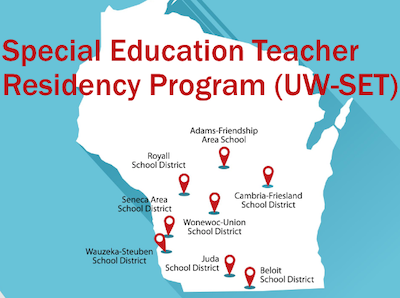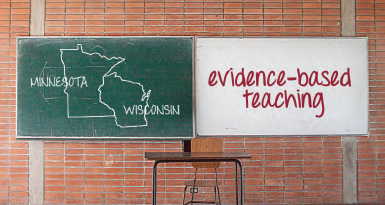Researchers studying internships at HBCUs
The Center for Research on College- to-Workforce Transitions (CCWT) is collaborating with the United Negro College Fund’s Career Pathways Initiative and a vocational psychologist to study internship programs at six historically black colleges and universities (HBCUs).
The $1.5 million longitudinal, mixed-methods study is funded by the National Science Foundation and aims to examine students’ experiences with their internships and how these experiences may impact their future wages, employment status, and vocational self-efficacy.

This three-year study will be part of the larger “College Internship Study.” Launched by CCWT Director Matt Hora and his team in early 2018, this work now includes over 14 institutions in the U.S., China, and Japan. CCWT is housed within the School of Education’s Wisconsin Center for Education Research.
“The field especially lacks insights into how internship programs are structured and experienced in the unique socio-cultural and historical contexts of HBCUs,” says Hora.
Hora has also enlisted Mindi Thompson, a vocational psychologist and associate professor with the School of Education’s Department of Counseling Psychology.
“My research is about exploring the career and educational development of students, particularly those students who are diverse and underrepresented in some way,” says Thompson. “Matt brings a deep understanding of internships and job skills through the lens of higher education.”
Exploring new ways to support special education
Faculty members from UW–Madison are part of a new group of higher education leaders coming together to examine ways to help school districts address the critical problem of recruiting and retaining special education teachers.
These efforts are led by the American Association of Colleges for Teacher Education (AACTE), which is bringing together experts from 10 colleges and universities to collaborate in a Networked Improvement Community (NIC).
Across Wisconsin, the number of special education teachers working under either an emergency license, or no license, more than doubled in just six years — from 3.1 percent in the 2010-11 academic year, to 7.4 percent in 2016-17. This means some of the state’s most vulnerable learners are increasingly being taught by underprepared teachers.
“Participating in the NIC will allow us to collaborate with other states and institutions to identify and evaluate ways to make a meaningful impact on increasing the special education teacher workforce,” says Andrea Ruppar, an associate professor with the Department of Rehabilitation Psychology and Special Education (RPSE) who led efforts to secure UW–Madison’s involvement in this project.
 Ruppar and colleagues within the School of Education — including Kimber Wilkerson (professor and faculty director of the Teacher Education Center) and Melinda Leko (associate professor and chair of RPSE) — are working hard to address special education teacher staffing challenges.
Ruppar and colleagues within the School of Education — including Kimber Wilkerson (professor and faculty director of the Teacher Education Center) and Melinda Leko (associate professor and chair of RPSE) — are working hard to address special education teacher staffing challenges.
EFFORTS UNDERWAY INCLUDE:
• The UW–Madison Special Education Teacher (SET) Residency Program, made possible via a $2.5 million U.S. Department of Education grant. In 14 months, participants graduate with a master’s degree and licensure in special education. They also receive induction support, a living stipend of $38,800,
and a guaranteed teaching opportunity in one of eight high- need districts around the state.
• The Accelerated Licensure in Special Education (ALSE) initiative. This partnership with the Madison Schools has recruited 15 special education teachers working without full licensure to take part in a program that will lead to a master’s degree and special education certification.
• RPSE faculty members received a grant from the Spencer Foundation to gather information about the experiences and needs of rural special education teachers to garner ideas on how to better support and develop these educators.
Wisconsin-Minnesota partnership receives $6.3 million award to advance evidence-based practices
A new collaboration of Wisconsin and Minnesota researchers formed to support education priorities in each state has won a five- year, $6.3 million grant from the U.S. Department of Education.
The project’s goal is to improve the academic achievement of elementary and secondary school students in the two-state region by advancing the use of evidence-based practices.
Researchers from each state’s flagship university, UW–Madison and the University of Minnesota, joined with Education Analytics, a Madison-based education nonprofit, to develop the winning proposal, which was announced in October. Together, they are leading the U.S. Department of Education Wisconsin–Minnesota Comprehensive Center (WMCC).
 “This award brings together a diverse team of experts in areas such as professional learning, evaluation, school leadership, special education, and data analytics to help local, state, and regional educators adopt and refine practices to better serve students,” says Steve Kimball, principal investigator for the
“This award brings together a diverse team of experts in areas such as professional learning, evaluation, school leadership, special education, and data analytics to help local, state, and regional educators adopt and refine practices to better serve students,” says Steve Kimball, principal investigator for the
new center and a senior researcher at the Wisconsin Center for Education Research within UW–Madison’s School of Education. Members of WMCC have extensive experience working with
Wisconsin and Minnesota state education agencies, regional education support organizations, professional associations, and school districts to translate research into practical applications.
“We see the center as the start of a new era of cross-state collaboration,” says Kim Gibbons, a WMCC co-director based at the Center for Applied Research and Educational Improvement at the University of Minnesota.
Although Minnesota and Wisconsin have historically ranked in the top third of all states for education quality, both states have persistently experienced large achievement gaps, particularly
for students of color and those identified for special education services.
“Our capacity-building services will help our region address significant and ongoing achievement gaps between student groups based on race, poverty, special education, and English language proficiency,” says Alisia Moutry, a WMCC co-director based at UW–Madison.
— By Janet L. Kelly, Wisconsin Center for Education Research
Around the School …
• A team of researchers from UW–Madison secured a $1.2 million grant to partner with the State of Wisconsin to examine a significant decline in the number of regulated early care and education providers operating over the past 15 years. “It is critically important that working families with young children have access to quality, affordable child care options. Thus, we need to better understand the factors that influence declines in child care supply in order to know where parents do not have access to care for their children,” says Amy Claessens, who is leading the project and holds the Gulbrandsen Chair in Early Childhood Education. She is an associate professor with the Department of Educational Policy Studies and is the associate director of the Center for Research on Early Childhood Education (CRECE).
• José Carlos Teixeira received two major awards for his experimental documentary film, “On Exile,” at The Artists Forum Festival of the Moving Image in New York in October. At the intersection of art, cinema, anthropology, and politics, “On Exile” reflects on the refugee experience, expanding on issues of migration, displacement, and otherness. This production earned both the Jurors Award and Best Documentary Short recognition for Teixeira, an assistant professor with the School of Education’s Art Department.
• “Reclaiming Community: Race and the Uncertain Future of Youth Work,” by Bianca Baldridge, is a 2019 American Educational Studies Association Critics’ Choice Book Award winner. Baldridge is a sociologist of education and an assistant professor with the Department of Educational Policy Studies.
• David Rosenthal became president of the National Council on Rehabilitation Education (NCRE) in
October. Rosenthal is a professor with the Department of Rehabilitation Psychology and Special Education.
The NCRE promotes itself as the premier professional organization of educators dedicated to quality services for persons with disabilities through education and research.
• Mindi Thompson this fall was accepted as a fellow of the American Psychological Association’s Society of Counseling Psychology. The associate professor with the Department of Counseling Psychology is a licensed and registered health service psychologist who also directs the Work and Wellness Lab, which studies career development across the lifespan, how environmental factors impact experiences across life domains, and factors that promote wellness. Fellowship is an honor bestowed upon members who have made “unusual and outstanding contributions or performance in the field of psychology.”